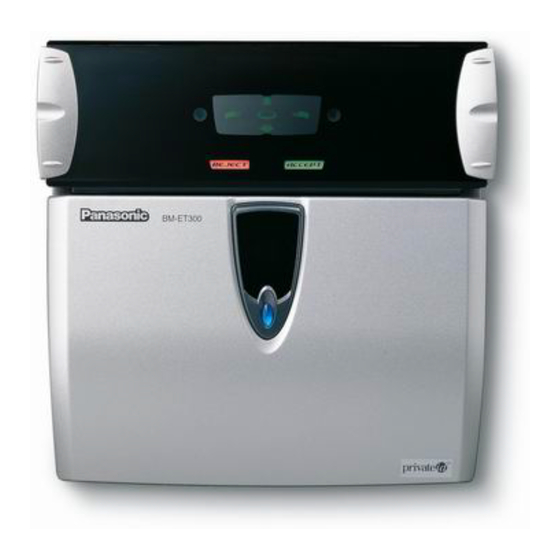Panasonic BM-ET300 Руководство по настройке - Страница 15
Просмотреть онлайн или скачать pdf Руководство по настройке для Цифровая камера Panasonic BM-ET300. Panasonic BM-ET300 16 страниц. Iris camera

• Wiegand Setting Parameters (common between
access control panels and card readers)
The parameters of Wiegand interface are set. The setting
should be accommodated to the specifications of an
access control panel and card reader, which are connect-
ed to the iris camera.
Bit Length: The bit length of data, which is received
from a card reader and which is transferred to an
access control panel, is set. 26 to 128 is available.
Pulse Width: The pulse width of the signal received/
transferred. 30, 40 or 50 µs is available.
Pulse Interval: The pulse interval of the signal
received/transferred. 1.0, 1.5, or 2.0 ms is available.
Reject ID: The data, which is output to an access con-
trol panel when recognition is not successfully com-
pleted, is entered in a hexadecimal number. When
entering the number, exclude the parity bit (2 bits).
For example, when bit length is set to 26, enter the
reject ID in 24 bits. (For the setting parameter, refer
to the specifications of an access control panel,
which is connected to the iris camera.)
• Other Setting Parameters
Server Certification: This parameter determines
whether to carry out server certification.
Yes: The iris camera will contact the iris server.
No: The iris camera will not contact the iris server.
Audio Mode: This parameter determines which of voice
guidance, shutter sound, and recognition result to
output.
Mute: Nothing is output.
Simple: Shutter sound and recognition result are
output.
Full: Voice guidance, shutter sound, and recogni-
tion result are output.
Guidance Language: This parameter determines the
language of voice guidance.
Available languages are English, Japanese,
German, French, Italian, Spanish, Russian, Chinese,
Korean, Arabian, Portuguese and Turkish.
Output 1 (Recognized Signal): If "Yes" is selected,
pulse signal will be output from recognition result
output 1 (ACCEPT) terminal, when recognition is
successfully completed. If "No" is selected, the
pulse signal will not be output.
Output 2 (Rejected Signal): If "Yes" is selected, pulse
signal will be output from recognition result output 2
(REJECT) terminal, when recognition is not suc-
cessfully completed. If "No" is selected, the pulse
signal will not be output.
Live indicator: This parameter determines the opera-
tion status of live indicator. Off, Blinking, or On is
available.
Mode of Operation: This determines the operation
mode of the iris camera.
Recognition: The iris camera is used as a recogni-
tion camera.
Enrollment: The iris camera is used as an enroll-
ment camera.
Security Level: This parameter determines how to save
the iris data distributed to the iris camera. It is
strongly recommended that High be selected.
High: The distributed iris data will be erased when
the power supply to the iris camera is shut
down. Iris recognition cannot be carried out
until the power is supplied and iris data is dis-
tributed to the camera again.
Normal: The distributed iris data will be saved even
after the power supply to the iris camera is shut
down. Iris recognition can be carried out
regardless of the connection between the cam-
era and iris server.
Access log: This parameter determines whether to
notify the recognition result (ACCEPT or REJECT) to
the iris server.
Yes: The access log is notified to the iris server.
No: The access log is not notified to the iris server.
15
